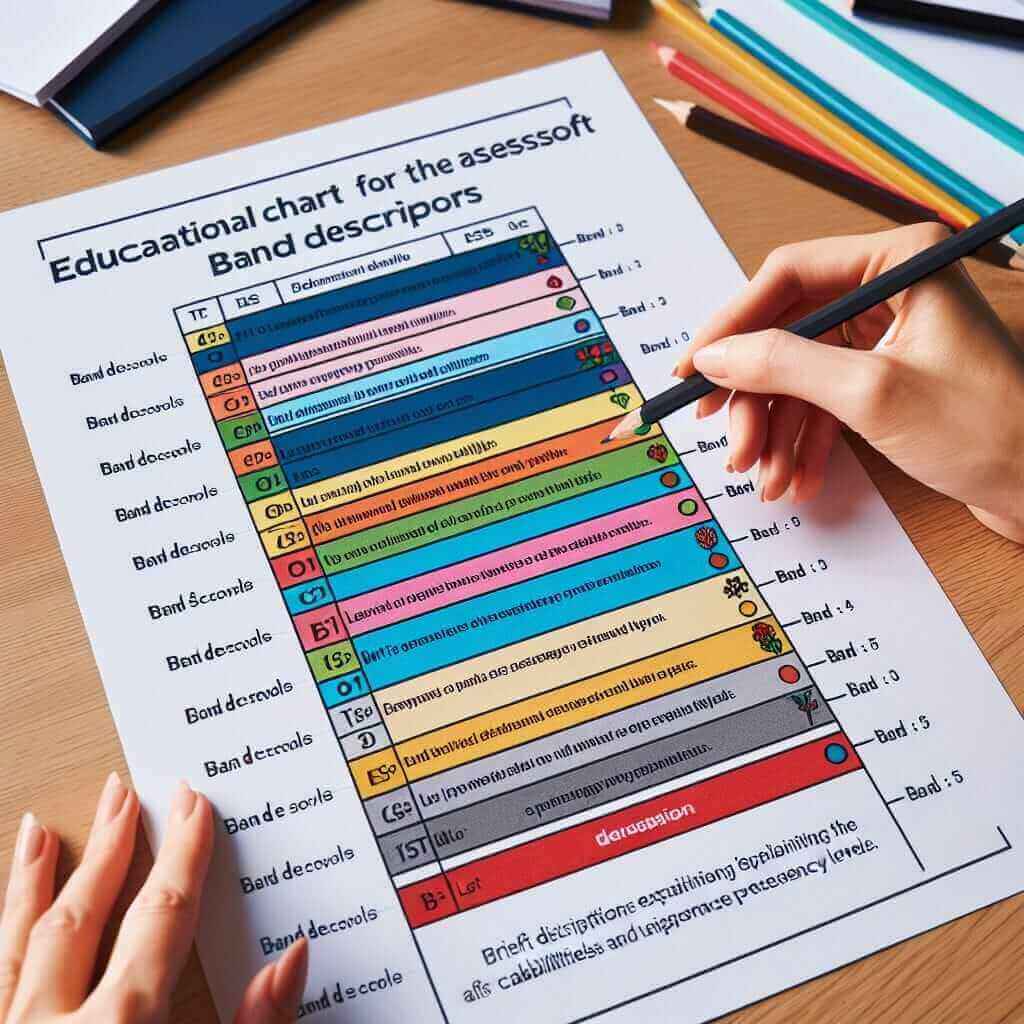Understanding the IELTS scoring system is crucial for anyone preparing for this significant exam. Let’s dive into the details of the IELTS band score, how each section is calculated, and some tips to help you achieve the best possible scores.
What is the IELTS Band Score?
The IELTS band score ranges from 1.0 to 9.0. Each of the four sections of the test – Reading, Listening, Writing, and Speaking – is scored individually, and the overall band score is the average of these four sections.
IELTS is available in two formats: Academic and General Training. The scoring system is slightly different for each, particularly in the Reading section. Let’s break down how each section is scored before we delve into tips and examples to help you excel.
Detailed Breakdown of IELTS Scoring
Listening and Reading Scores
Both the Listening and Reading sections consist of 40 questions. For each correct answer, you receive one point. These raw scores are then converted into band scores. The tables below illustrate the conversion for different numbers of correct answers for Academic and General Training modules.
Listening (Academic and General Training)
| Correct Answers | Band Score |
|---|---|
| 39-40 | 9.0 |
| 37-38 | 8.5 |
| 35-36 | 8.0 |
| 33-34 | 7.5 |
| 30-32 | 7.0 |
| 27-29 | 6.5 |
| 23-26 | 6.0 |
| 20-22 | 5.5 |
| 16-19 | 5.0 |
| 13-15 | 4.5 |
| 10-12 | 4.0 |
| 7-9 | 3.5 |
| 5-6 | 3.0 |
| 3-4 | 2.5 |
Reading (Academic)
| Correct Answers | Band Score |
|---|---|
| 39-40 | 9.0 |
| 37-38 | 8.5 |
| 35-36 | 8.0 |
| 33-34 | 7.5 |
| 30-32 | 7.0 |
| 27-29 | 6.5 |
| 23-26 | 6.0 |
| 20-22 | 5.5 |
| 16-19 | 5.0 |
| 13-15 | 4.5 |
| 10-12 | 4.0 |
| 7-9 | 3.5 |
| 5-6 | 3.0 |
| 3-4 | 2.5 |
Reading (General Training)
| Correct Answers | Band Score |
|---|---|
| 40 | 9.0 |
| 39 | 8.5 |
| 38 | 8.0 |
| 36-37 | 7.5 |
| 34-35 | 7.0 |
| 32-33 | 6.5 |
| 30-31 | 6.0 |
| 27-29 | 5.5 |
| 23-26 | 5.0 |
| 19-22 | 4.5 |
| 15-18 | 4.0 |
| 12-14 | 3.5 |
| 8-11 | 3.0 |
| 5-7 | 2.5 |
Speaking and Writing Scores
The Speaking and Writing sections are marked by trained examiners using detailed band descriptors.
Speaking
This section is consistent across both Academic and General Training formats. Candidates are assessed on:
- Fluency and Coherence
- Lexical Resource
- Grammatical Range and Accuracy
- Pronunciation
Each of these criteria is equally weighted.
Writing
This section differs between Academic and General Training:
- Academic Task 1: Requires candidates to describe visual information (graphs, tables, maps).
- General Training Task 1: Involves writing a letter (informal, formal, or semi-formal).
Both tasks are scored on:
- Task Achievement (Task 1) / Task Response (Task 2)
- Coherence and Cohesion
- Lexical Resource
- Grammatical Range and Accuracy
Calculating the Overall Band Score
To calculate your overall band score, the scores from the four sections are averaged and rounded to the nearest half-band or whole band.
Example:
- Listening: 7.5
- Reading: 7.0
- Writing: 6.0
- Speaking: 6.5
Total: (7.5 + 7.0 + 6.0 + 6.5) / 4 = 6.75 → Rounded to 7.0.
Interpretation of Band Scores
Band scores assess the English proficiency level of candidates:
- 1-2.5: Extremely limited ability.
- 3-4.5: Limited to modest ability.
- 5-6.5: Moderate to competent.
- 7-8.5: Good to very good.
- 9: Expert.
The specific performance required to achieve each band score is detailed in band descriptors.

Applied Tips and Strategies for High IELTS Scores
Understanding and Applying Vocabulary and Grammar
Expand your vocabulary and practice applying it in context. Focus on coherence and cohesion in your writing and speaking. Use transitional words and phrases to link ideas smoothly.
Practice Active Listening and Reading
Immerse yourself in English through listening to podcasts, news, and conversing with native speakers. For reading, engage with various texts, comprehension exercises, and practice summarizing content.
Familiarize with Different Question Types
Practice all types of questions you might encounter in the IELTS exam. Use past exam papers and timed exercises to improve your speed and accuracy.
Common Mistakes to Avoid
- Listening: Misunderstanding plurals, tenses, and partial answers.
- Reading: Overlooking key instructions, not skimming/scanning effectively.
- Speaking: Hesitation, limited vocabulary, grammatical errors.
- Writing: Task misinterpretation, lack of clear structure, inadequate development of ideas.
Practical Exercises and Practice Papers
Make use of reliable study resources available online. Engage with practice papers and mock exams. Seek feedback from proficient speakers or instructors.
Conclusion
Understanding the IELTS scoring system, maximizing your knowledge in each of the test’s sections, and applying the specific strategies shared in this guide will set you on the path to achieving the score you need. Practice, perseverance, and proper guidance are keys to your success.
Feel free to share this guide if you found it helpful, and explore more on our website for all your IELTS preparation needs. Best of luck on your IELTS journey!